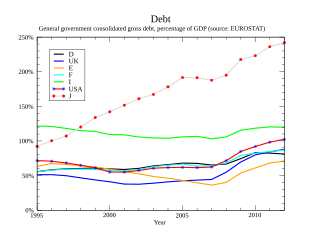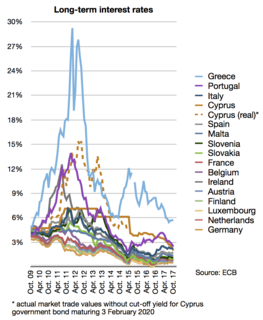 W
WIn public finance, government debt, also known as public interest, public debt, national debt and sovereign debt, is the total amount of debt owed at a point in time by a government or state to lenders. Government debt can be owed to lenders within the country or owed to foreign lenders. Government debt contrasts to the annual government budget deficit, which is a flow variable that equals the difference between government receipts and spending in a single year. The debt is the accumulation of all prior deficits. The government is typically obligated to pay interest on its debt.
 W
WDebt crisis is a situation in which a government loses the ability of paying back its governmental debt. When the expenditures of a government are more than its tax revenues for a prolonged period, the government may enter into a debt crisis. Various forms of governments finance their expenditures primarily by raising money through taxation. When tax revenues are insufficient, the government can make up the difference by issuing debt.
 W
WIn economics, the debt-to-GDP ratio is the ratio between a country's government debt and its gross domestic product (GDP). A low debt-to-GDP ratio indicates an economy that produces and sells goods and services is sufficient to pay back debts without incurring further debt. Geopolitical and economic considerations – including interest rates, war, recessions, and other variables – influence the borrowing practices of a nation and the choice to incur further debt. It should not be confused with a deficit-to-GDP ratio, which, for countries running budget deficits, measures a country's annual net fiscal loss in a given year as a percentage share of that country's GDP; for countries running budget surpluses, a surplus-to-GDP ratio measures a country's annual net fiscal gain as a share of that country's GDP.
 W
WThe Drago Doctrine was announced in 1902 by Argentine Minister of Foreign Affairs Luis María Drago in a diplomatic note to the United States.
 W
WThe European debt crisis, often also referred to as the eurozone crisis or the European sovereign debt crisis, is a multi-year debt crisis that has been taking place in the European Union (EU) since the end of 2009. Several eurozone member states were unable to repay or refinance their government debt or to bail out over-indebted banks under their national supervision without the assistance of third parties like other eurozone countries, the European Central Bank (ECB), or the International Monetary Fund (IMF).
 W
WA fiscal adjustment is a reduction in the government primary budget deficit, and it can result from a reduction in government expenditures, an increase in tax revenues, or both simultaneously.
 W
WThe Government Securities Act, 2006 is a legislation of the Parliament of India, which aims to introduce various improvements in the government securities market and the management of government securities by the Reserve Bank of India (RBI).
 W
WIn public finance, internal debt or domestic debt is the component of the total government debt in a country that is owed to lenders within the country. Internal government debt is complement is external government debt. The main sources of funds for internal debts are commercial banks and other financial institutions.
 W
WThe Paris Club is a group of officials from major creditor countries whose role is to find co-ordinated and sustainable solutions to the payment difficulties experienced by debtor countries. As debtor countries undertake reforms to stabilize and restore their macroeconomic and financial situation, Paris Club creditors provide an appropriate debt treatment.
 W
WIn financial transactions, a warrant is a written order by one person that instructs or authorises another person to pay a specified recipient a specific amount of money or supply goods at a specific date. A warrant may or may not be negotiable and may be a bearer instrument that authorises payment to the warrant holder on demand or after a specific date. Governments and businesses may pay wages and other accounts by issuing warrants instead of cheques.